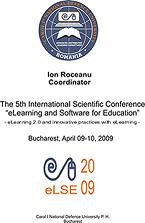SEI – A PROJECT BASED ELEARNING IMPLEMENTING NATIONWIDE ELEARNING PROJECTS – A GUARANTEE OF A BETTER FUTURE
SEI – A PROJECT BASED ELEARNING IMPLEMENTING NATIONWIDE ELEARNING PROJECTS – A GUARANTEE OF A BETTER FUTURE
Author(s): Radu JugureanuSubject(s): Education
Published by: Carol I National Defence University Publishing House
Keywords: eLearning; educational system; educational software; computer-assisted learning; information technology; multi-touch system; projectbased learning
Summary/Abstract: Modern society is based on information, and this has led to the use of IT&C being used as a reference point for systemic changes being implemented in educational systems. Since the beginning of the information revolution, challenges have been shaped by three major factors. These directions, highlighted at the Lisbon and Feira Summits, are the equipping of schools, the training of teachers and the provision of necessary resources. The Lisbon Strategy, which aims to make the European Union the most dynamic and competitive knowledge-based economy in the world, places special emphasis on education. The Lisbon strategy intends to rely on relevant experience gained by European countries with regard to their individual educational programs and projects to archive its social and economic goals. This strategy has the potential to reinforce innovation, to sustain excellence, and to create opportunities for further multidisciplinary developments. Advances in Information and Communication Technology (ICT) models, technologies, and infrastructure can only occur if we develop new generations based on specific understanding techniques, cognitive tools for living and working in tomorrow’s knowledgeable Europe. However, the development of effective programs should be oriented towards delivering improved education and training to the European workforce. Nowadays, we are witnessing a revolution in education. This revolution is directly affecting the tools used by teachers and pupils as well as the way that these new IT&C resources act as an agent for change when introducing new pedagogical paradigms in schools. While the basic principles remain the same – with teachers teaching students in the classroom – ICT tools allow for enhanced interactivity and advanced communication between the main beneficiaries, by improving personal experience, exercises and direct experimentation methodology. Romania implemented a major educational program starting with 2001. The IT-based Educational System, which aims to support the objectives of the educational reform in conformity with the European strategies, was an ambitious endeavor initiated by the Ministry of Education and Research. The strategy of the Romanian government aims to utilise ICT to support its involvement in the educational reform, as it conforms to the eEurope action plan developed by the European Union in 2005. SIVECO Romania has developed many successful eLearning products and packages. Almost every educational institution in Romania currently utilises at least one of these popular packages, with 3300 Secondary schools and all High schools benefitting from nearly 1700 of these IT-based packages.
Journal: Conference proceedings of »eLearning and Software for Education« (eLSE)
- Issue Year: 5/2009
- Issue No: 01
- Page Range: 17-26
- Page Count: 10
- Language: English

